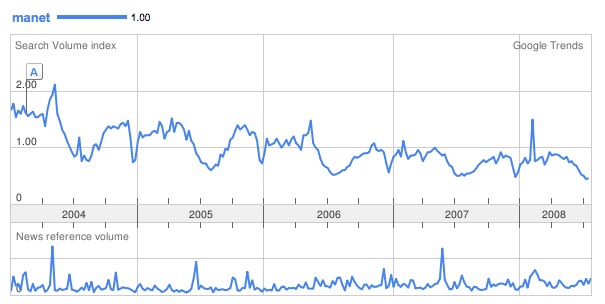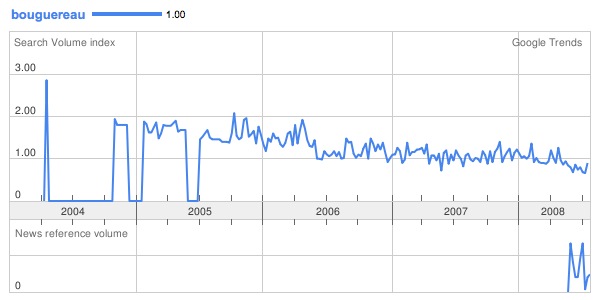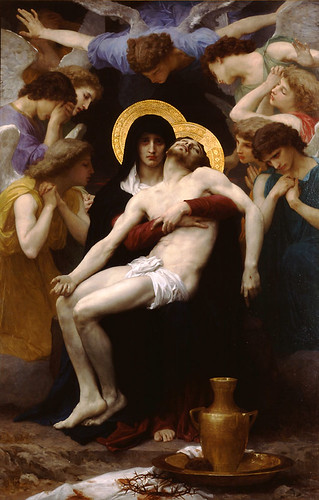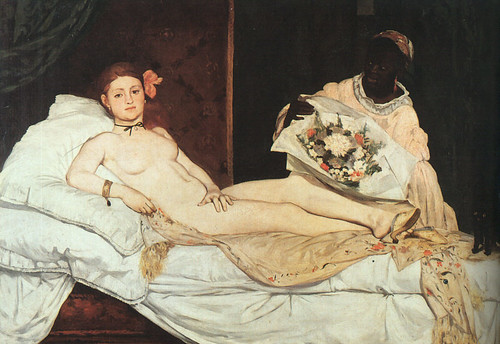William Adolph Bouguereau. Pieta (1876) Oil on canvas. 230 BY 148CM. Dallas Museum of Fine Arts, Dallas, Texas
At the 1878 Universal Exposition in Paris, Edouard Manet was asked which of all the painters then living would be best remembered in 100 years. His answer: William Adolph Bouguereau.
Manet (1832-1883) and Bougeureau (1825-1905) represented two polar movements in painting. Manet, regularly controversial in his work, had been the leader of the Impressionist movement and Bougeureau was the darling of the Academic tradition supported by the Ecole des Beaux-Arts in Paris.
Thanks to Google Trends and Amazon.com, it is possible to get some indication of whether or not Manet’s prediction, at least in comparison to his own work, has come true.
Over the past few years, Google has been tracking the number of searches done specific keywords. Because Manet and Bouguereau have unique names, it is fairly easy to narrow down searches relating to them as opposed to other painters (e.g. Ingres is the names of the painter and a Fortune 500 company.)

Google Trends of Manet searches from 2004 to 2008.

Google Trends of Bouguereau searches from 2004 to 2008.
At the time of this post, a standard search on Google.com produces 4,870,000 results for Manet and 1,140,000 for Bouguereau. An Amazon.com search produces 12,721 books for Manet and 1,071 for Bouguereau.
The comparison of these two artists and their popularity through these methods is hardly comprehensive. But, it is one indication that Manet is more popular than he is prophetic.
Maybe he was misquoted and meant 200 years. I’ll follow up with another post then.


Good to know you’re planning to be around.
In our era, Manet has greater cultural meaning than Bouguereau and could be referenced for many reasons. It would be interesting to know how many of those almost 5 million Manet items are only about painting, or would be specifically of art historical interest. How many of them refer to the violent shock felt by many Salon-goers at the nudity of Victorine Meurand in Le dejeuner sur l’herbe, or at the knowledge Olympe was a prostitute rather than an allegory? Is this about art, or about folkways in the run-up to the early Modern era? I wouldn’t think you’d find that range of reasons to write about Bouguereau. “Great painter and pillar of the Academy” is not so rife with social history. But how fabulous to know what Manet thought of him!
I think that Manet has been favored for some time by those who have influence in art and art criticism. That doesn’t mean he wasn’t an important or great painter. (Personally, I love his work.) For some time, the avante guard movements reacting against Academic painting–Manet being part of that group–have had full support from art buyers and critics. But, I think that there is a movement discovering academic painting again without the prejudices of 100 years of art theory.
This can be summed up by something my friend told me about his teenage daughter: when she went to college, she didn’t want to put Van Gogh on her wall because “everyone was doing it.” Instead, she opted for print of a painting by Ingres.
To the rising generation, the avante guard is no longer avante. Some of them are seeing academic painting in a new light that hasn’t been true for more than a century.
An intertesting quotation, but I think it might be in the “too good to be true” category. Could we have the source, searched back to the primary source? I’d like to see it in context. It might have been meant sardonically, voiced out of deep disadiain for common taste–Manet was qutie an aristocrat. I’ll look through my five foot shelf on Manet when I get home; I’m on vacation. But I’m fairly sure I would have caught it; I habitually look up Gerome and Bouguereau in the index in any new book i see about late 19th century paiting. [I, myself, have been searchng for years for a passage which I fainlty remember–or misremeber–wherein Cezanne is quoted as saying he could not compose a body as well as Bougereau. Can’t find it.] It might be a mis-rememberd verstion of a conversation on the topic from Low’s autobiography (better citation when I get home). Manet & Bouguereau scholars, on your mark, get ready, set, go! find the primary source of this purported Manet quotation!
I, too, am on vacation and away from my books. I read the quote just before leaving for England. When I get back, I’ll look up the primary source and include it.
If you ever find the Cezanne quote, I’d love to know it.
I’ll get back to you on this in a week or so.